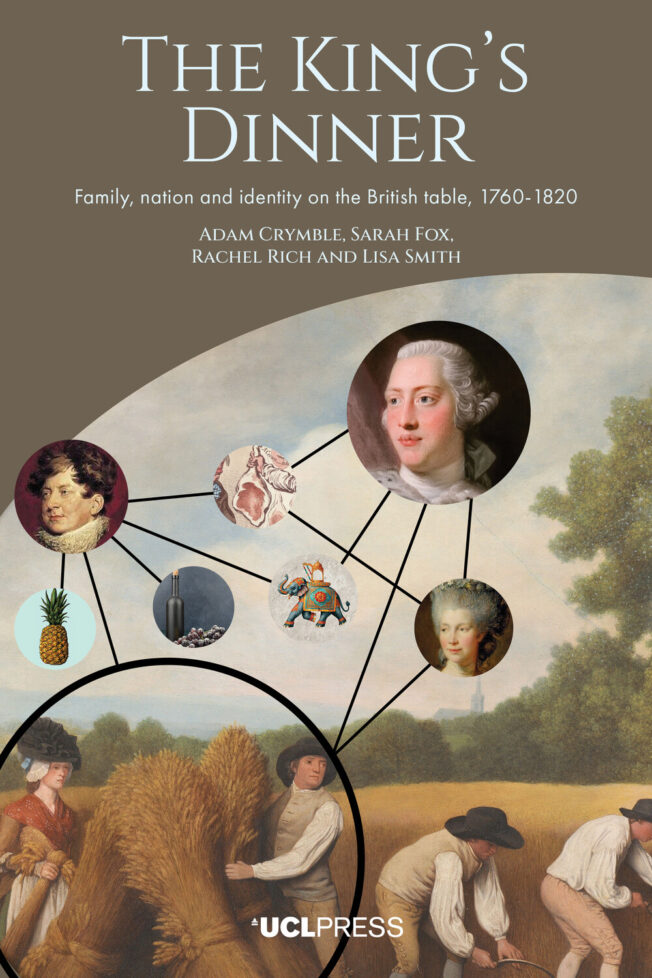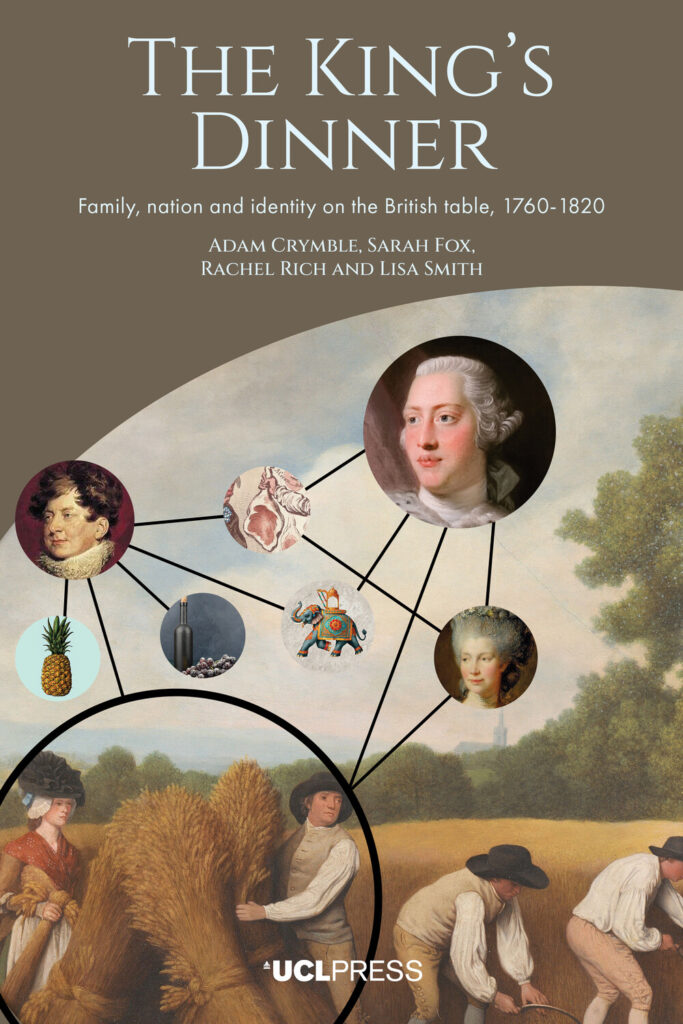
The King’s Dinner
Family, nation, and identity on the British table, 1760-1820
Adam Crymble (Author), Sarah Fox (Author), Rachel Rich (Author), Lisa Smith (Author)
The King’s Dinner is about what it meant to be British at the end of the eighteenth century. Drawing on a large, open dataset of two royal household kitchen ledgers, the authors study the role and influence of food in understanding British identity. Analysing trade routes, migration, agricultural changes, recipes, and flavours they argue that Britishness was more complex and more multicultural than previously recognised.
Starting at George III’s Kew Palace and the Prince Regent’s Carlton House, then moving in ever wider circles, the book considers the significance of food for understanding the royal family, the wider British population, their European neighbours, and the British and colonised people in the Atlantic world and the Indian subcontinent. With a growing overseas empire, Britain was an increasingly powerful nation, and the ability to choose was one of the ways this power was exercised. The cuisine that emerged was complex, with wealthy Britons adopting, adapting, or rejecting the foods of European enemies and allies or colonised peoples and places. ‘Britishness’ was an ever-shifting balance of European multiculturalism, imperial ambition, tradition and experimentation, a messy mix that reveals the entanglement of cultures and cuisines, continually changed by the people who cook and eat the food.
List of figures
List of tables
List of contributors
List of abbreviations
Acknowledgements
Cast of characters and key diners
Introduction
Part I: Feeding the palaces
1 Provisioning the royal households
2 Feeding the palace
Part II: European presences
3 German migrants, royal dinners
4 French gastronomy at the heart of the British nation
Part III: Selectively tasting the empire
5 Caribbean commodities and rejecting a taste for the tropics
6 Indian flavours and Britishness in transition
Conclusion
7 British food in a multiethnic kingdom
Bibliography
Index
DOI: 10.14324/111.9781806550869
Number of illustrations: 28
Publication date: 01 June 2026
PDF ISBN: 9781806550869
EPUB ISBN: 9781806550876
Hardback ISBN: 9781806550845
Paperback ISBN: 9781806550852
Adam Crymble (Author) 
Adam Crymble is associate professor of digital humanities in the department of digital humanities at UCL. His research has focused on the experience of migrants in eighteenth and early nineteenth century Britain. This has included work on Irish, Black, and English internal migrants in London. He has an interest in historical method, and data science in the service of the humanities. He is a founding editor of Programming Historian and the author of Technology & the Historian (2021). This project provided an opportunity to expand his social history research into cultural history, for the first time.
Sarah Fox (Author) 
Sarah Fox is a senior lecturer in history at Edge Hill University. Her research explores the lives and relationships of ordinary people in eighteenth-century England, and their connection to the broader structures that organise their lives. She has written and co-authored publications on the social history of law and regulation (with Margaret Brazier), the role of empathy in historical research, and embodied experiences of growing old in the past (with Karen Harvey). Her first book, Giving Birth in Eighteenth-Century England (2022) was published open access by the University of London and was shortlisted for the Royal Historical Society’s Whitfield Prize.
Rachel Rich (Author) 
Rachel Rich is a reader in modern European history at Leeds Beckett University, and co-editor-in-chief of Food & History, the journal of the IEHCA. Her research has focused on food and eating, and in particular on women’s domestic roles, and on female authors of cookbooks and other forms of domestic advice. Rachel is the author of Bourgeois Consumption: Food, Space and Identity in London and Paris, 1850-1914 (2010) as well as articles on domesticity and timekeeping, and on women cookery writers, in journals including Gender & History and Cultural and Social History.
Lisa Smith (Author) 
Lisa Wynne Smith is a senior lecturer in history at the University of Essex. She has published widely on recipes, health, gender, the household, and the body. She developed a database of Sir Hans Sloane’s correspondence, co-founded the Early Modern Recipes Online Collective (2012), and co-founded The Recipes Project blog (2012). Recent publications include book chapters on eighteenth-century fertility and beauty (2026) and early modern loneliness and food (2023), a prize-winning article (with Cathy McClive) on women and medical entrepreneurialism in eighteenth-century Lyon (2024), and an edited volume of A Cultural History of Medicine in the Age of Enlightenment (2021).
Imperial Science, the Organic Movement and the Path to Shangri La, 1900-1969
Ashok Malhotra,
23 March 2026
Women’s Labour Activism in Eastern Europe and Beyond
Selin Çağatay, Mátyás Erdélyi, Alexandra Ghiț, Olga Gnydiuk, Veronika Helfert, Ivelina Masheva, Zhanna Popova, Jelena Tešija, Eszter Varsa, Susan Zimmermann,
26 August 2025
The King’s Dinner
Family, nation, and identity on the British table, 1760-1820
The King’s Dinner is about what it meant to be British at the end of the eighteenth century. Drawing on a large, open dataset of two royal household kitchen ledgers, the authors study the role and influence of food in understanding British identity. Analysing trade routes, migration, agricultural changes, recipes, and flavours they argue that Britishness was more complex and more multicultural than previously recognised.
Starting at George III’s Kew Palace and the Prince Regent’s Carlton House, then moving in ever wider circles, the book considers the significance of food for understanding the royal family, the wider British population, their European neighbours, and the British and colonised people in the Atlantic world and the Indian subcontinent. With a growing overseas empire, Britain was an increasingly powerful nation, and the ability to choose was one of the ways this power was exercised. The cuisine that emerged was complex, with wealthy Britons adopting, adapting, or rejecting the foods of European enemies and allies or colonised peoples and places. ‘Britishness’ was an ever-shifting balance of European multiculturalism, imperial ambition, tradition and experimentation, a messy mix that reveals the entanglement of cultures and cuisines, continually changed by the people who cook and eat the food.

